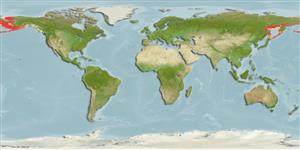Teleostei (teleosts) >
Perciformes/Zoarcoidei (Eelpouts and pricklebacks) >
Lumpenidae (Eel pricklebacks)
Etymology: Acantholumpenus: Greek, akantha = thorn + Latin, lumpus = to look disagreable, 1545 (Cyclopterus lumpus) and Latin, lumpus = a uncouth-looking spiny fish of a leaden blue colour; 1545 (Ref. 45335).
Eponymy: Charles Leslie McKay (1855–1883) was an amateur naturalist in the US Army Signal Corps, who collected specimens in the Nushagak area. [...] (Ref. 128868), visit book page.
More on author: Gilbert.
Environment: milieu / climate zone / depth range / distribution range
Ecology
Marine; brackish; demersal; depth range 0 - 200 m (Ref. 56557). Polar; 70°N - 44°N, 134°E - 120°W
North Pacific: Hokkaido, Japan to the Okhotsk and Bering seas. Arctic Ocean: Arctic coast of Canada.
Size / Weight / Age
Maturity: Lm ? range ? - ? cm
Max length : 70.0 cm SL male/unsexed; (Ref. 559); max. reported age: 12 years (Ref. 56557)
Dorsal spines (total): 68 - 76; Dorsal soft rays (total): 0; Anal spines: 2; Anal soft rays: 41 - 48. Caudal fin slightly grayish without dark bands; roof of oral cavity with a dark region (Ref. 559). Spines of pelvic and anal fins rigid and easily discernible from other soft rays (Ref. 559). Eye diameter less than snout length (Ref. 559).
Found over mud and sand bottoms to depths of about 56 meters; often in brackish waters (Ref. 51666). Benthic; feeds on worms, crustaceans, sea urchins and molluscs (Ref. 58426).
Life cycle and mating behavior
Maturity | Reproduction | Spawning | Eggs | Fecundity | Larvae
Robins, C.R., R.M. Bailey, C.E. Bond, J.R. Brooker, E.A. Lachner, R.N. Lea and W.B. Scott, 1991. Common and scientific names of fishes from the United States and Canada. Am. Fish. Soc. Spec. Publ. (20):183 p. (Ref. 3814)
IUCN Red List Status (Ref. 130435: Version 2024-1)
Threat to humans
Harmless
Human uses
Tools
Special reports
Download XML
Internet sources
Estimates based on models
Preferred temperature (Ref.
123201): -1.5 - 5.6, mean 0.2 °C (based on 1195 cells).
Phylogenetic diversity index (Ref.
82804): PD
50 = 1.0000 [Uniqueness, from 0.5 = low to 2.0 = high].
Bayesian length-weight: a=0.00263 (0.00144 - 0.00479), b=2.91 (2.75 - 3.07), in cm total length, based on LWR estimates for this species & (Sub)family-body (Ref.
93245).
Trophic level (Ref.
69278): 3.1 ±0.2 se; based on diet studies.
Resilience (Ref.
120179): Low, minimum population doubling time 4.5 - 14 years (Preliminary K or Fecundity.).
Fishing Vulnerability (Ref.
59153): Moderate to high vulnerability (54 of 100).
